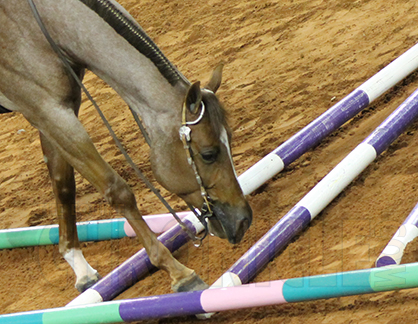Could Ulcers be Affecting Your Horse’s Stride Length?
 by: Boehringer Ingelheim Vetmedica, Inc.
by: Boehringer Ingelheim Vetmedica, Inc.
Ulcers in horses could be causing poor performance.1
No matter the discipline in which you compete, your horse’s stride length is important. Longer strides mean faster times, bigger jumps and prettier movement. To get that edge, horse owners often focus on muscle conditioning and joint health. Another key area in which to focus performance horse management is digestive health, specifically equine stomach ulcers.
The way performance horses are commonly fed, along with the stress of training, showing and traveling, causes acid levels to rise past the glandular portion of the horse’s stomach, leading to ulcers. That pain from sores on the stomach wall can cause your horse’s performance to suffer. Two out of three performance horses have stomach ulcers, and those with ulcers have a shorter stride length than those without.1,2
“Reduced performance, including a shorter stride length, is likely a consequence of gastric pain caused by ulcers,” says Hoyt Cheramie, DVM, MS, DACVS, Senior Equine Professional Service Veterinarian, Boehringer Ingelheim. “When we ask horses for precise athletic maneuvers – to run, jump, spin and slide – if they have gastric discomfort, they aren’t going to be able perform as well.”
Preventing ulcers is the optimal way to ensure that they don’t inhibit performance.
Ulcergard® (omeprazole), by Merial, inhibits acid production at the source – the proton pumps in the lower part of the stomach.3 ULCERGARD has a patented formulation that protects the omeprazole from being broken down by stomach acid. This ensures that the omeprazole makes it through the acid of the stomach and into the small intestine. It is then absorbed into the bloodstream and makes its way back to the proton pump to work effectively.
To prevent ulcers, in addition to ULCERGARD, Cheramie suggests feeding management changes when appropriate, such as increasing grazing time, using a slow-feed hay net, replacing calories from cereal grains with good quality roughage or quality fat feedstuffs and adding alfalfa to the diet.
Finding ways to increase stride length and ensure your horse is performing to the best of his ability is challenging enough. Don’t let ulcers negatively affect performance. Keep digestive health and ulcer prevention a top priority.
IMPORTANT SAFETY INFORMATION: ULCERGARD can be used in horses that weigh at least 600 pounds. Safety in pregnant mares has not been determined.
About Boehringer Ingelheim Animal Health
As the second largest animal health business in the world, Boehringer Ingelheim is committed to improving animal health. With more than 10,000 employees worldwide, Boehringer Ingelheim Animal Health has products available in more than 150 markets and a global presence in 99 countries. For more information about Boehringer Ingelheim Animal Health, click here.
Boehringer Ingelheim
Innovative medicines for people and animals have for more than 130 years been what the research-driven pharmaceutical company Boehringer Ingelheim stands for. Boehringer Ingelheim is one of the industry’s top 20 pharmaceutical companies and to this day remains family-owned. Day by day, some 50,000 employees create value through innovation for the three business areas human pharmaceuticals, animal health and biopharmaceutical contract manufacturing. In 2016, Boehringer Ingelheim achieved net sales of around 15.9 billion euros. With more than three billion euros, R&D expenditure corresponds to 19.6 per cent of net sales.
Social responsibility comes naturally to Boehringer Ingelheim. That is why the company is involved in social projects, such as the “Making More Health” initiative. Boehringer Ingelheim also actively promotes workforce diversity and benefits from its employees’ different experiences and skills. Furthermore, the focus is on environmental protection and sustainability in everything the company does.
More information about Boehringer Ingelheim can be found on www.boehringer-ingelheim.com or in our annual report: http://annualreport.boehringer-ingelheim.com.
Merial is now part of Boehringer Ingelheim.
®ULCERGARD is a registered trademark of Merial. ©2018 Merial, Inc., Duluth, GA. All rights reserved. EQU-0546-EGUS0418.
1Sykes BW, Hewetson M, et al. European College of Equine Internal Medicine Consensus Statement – Equine Gastric Ulcer Syndrome in Adult Horses. J Vet Intern Med. 2015;29:1288-1299.
2Nieto JE, Snyder JR, et al. Effect of gastric ulceration on physiologic responses to exercise in horses. Am J Vet Res. 2009;70:787–95.
3ULCERGARD product label.










